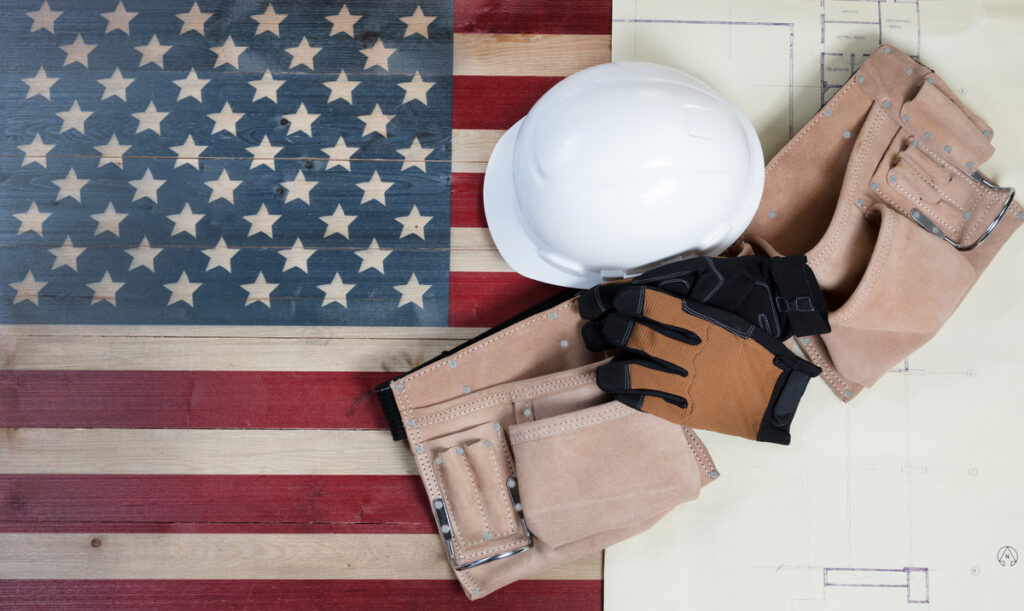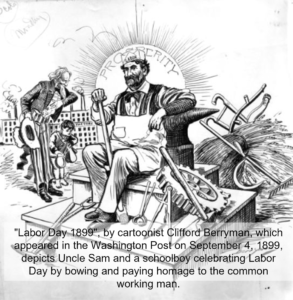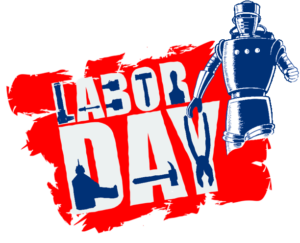Civilization has always moved forward on the backs of laborers (i.e., the people who actually do the work that makes society function). From the great manmade wonders of the ancient world to the amazing technologies that have revealed the wonders of the universe, human labor has played a vital role. The staff at the Khan Academy notes, “About 12,000 years ago, human communities started to function very differently than in the past. Rather than relying primarily on hunting or gathering food, many societies created systems for producing food. By about 10,000 BCE, humans began to establish agricultural villages. This had massive ramifications on the social sphere, marking an important departure from past social systems; people lived in larger, denser, and more permanent settlements, and not everyone had to devote their full time to food production. Since there was no need for all residents to devote themselves full time to producing food, specialization within society was made possible. Thus, surplus food, food that did not go directly to farmers’ families, was distributed to members of the society.”[1] They go on to note:
“Historians and anthropologists are still trying to understand what other variables were at play, such as large-scale irrigation projects, warfare, trade, geography, and competition. Each society grew more complex in response to its own set of environmental, social, and political stimuli. … Civilizations evoke images of stone walls, monuments, and roads, but they are more than robust physical infrastructure. To facilitate the organization and administration of these large, dense communities, people began to create social infrastructures: economic, political, and religious institutions that created new social hierarchies. These hierarchies were populated with people playing specialized roles, such as professional administrators, farmers, artisans, traders, merchants, and spiritual leaders. Additionally, due to increased trade and conflict with external civilizations, cities required diplomats, armies, and centralized rulers.”
One of the inevitable results of complex societies was a growing gap between those who owned land and businesses and those who labored in the service of owners. Some owners treated their employees fairly, but many others did not. Henry David Thoreau (1817–1862), a U.S. iconoclast, philosopher, author, and naturalist, believed it was Congress’ task to protect laborers since hard work was part of the pursuit of happiness discussed in the Declaration of Independence. Thoreau wrote, “Such is the labor which the American Congress exists to protect — honest, manly toil — honest as the day is long — that makes his bread taste sweet, and keeps society sweet — which all men respect and have consecrated; one of the sacred band, doing the needful but irksome drudgery.”[3] His description of “manly toil …. doing the needful but irksome drudgery” should irritate a lot of women who have also toiled tirelessly and often have had to engage in even more difficult work than men.
Over the centuries, the ill-treatment of workers instigated numerous rebellions and eventually led to the rise of the labor movement. Journalist Pete Fehrenbach writes, “The roots of the labor movement in the United States can be traced at least as far back as the settlement of first British colony in Jamestown, Virginia, in 1607, when, according to the AFL-CIO’s Labor History Timeline, ‘English planters founded the Jamestown colony and complained about the lack of laborers.'”[2] According to Fehrenbach, the labor movement in the U.S. first gained traction following the Civil War. He reports, “The first national labor federation in the United States, the National Labor Union, was founded in 1866. Led by William H. Sylvis, the NLU declared that ‘the interests of the labor cause demand that all workingmen be included within the ranks without regard to race or nationality.’ The NLU paved the way for other organizations such as the Knights of Labor and the American Federation of Labor. It dissolved in 1874.”
As noted above, history is littered with uprisings and violence associated with laborers protesting their working conditions. One such violent episode occurred in 1877 during a strike against the Baltimore & Ohio Railroad. According to Fehrenbach, the strike began in Martinsburg, West Virginia, in response to a series of wage cuts by the railroad. The violence, however, was not localized. Fehrenbach reports, “[The West Virginia riot] ignited a series of strikes across four mid-Atlantic and Midwestern states. The ensuing violence resulted in federal troops being summoned for the first time in a labor dispute. The upheaval lasted about 45 days and was eventually quelled by local and state militias aided by federal troops.” Although the labor movement has often been at the heart of violent episodes, the movement’s goal has always been to have workers and employers negotiate labor conditions in a civil manner.
Labor Day began as way to honor the contribution of laborers to the U.S. economy. According to the U.S. Department of Labor, “Labor Day, the first Monday in September, is a creation of the labor movement and is dedicated to the social and economic achievements of American workers. It constitutes a yearly national tribute to the contributions workers have made to the strength, prosperity, and well-being of our country.” It continues, “The first Labor Day holiday was celebrated on Tuesday, September 5, 1882, in New York City, in accordance with the plans of the Central Labor Union. The Central Labor Union held its second Labor Day holiday just a year later, on September 5, 1883. In 1884 the first Monday in September was selected as the holiday, as originally proposed, and the Central Labor Union urged similar organizations in other cities to follow the example of New York and celebrate a ‘workingmen’s holiday’ on that date. The idea spread with the growth of labor organizations, and in 1885 Labor Day was celebrated in many industrial centers of the country.”
Samuel Gompers, the famous labor organizer, once said, “Labor Day differs in every essential from other holidays of the year in any country. All other holidays are in a more or less degree connected with conflict and battles of man’s prowess over man, of strife and discord for greed and power, of glories achieved by one nation over another. Labor Day is devoted to no man, living or dead, to no sect, race or nation.” Much of the political division in this country is the result of working people believing they no longer have a voice in how the country progresses. Both parties claim to be for the working class, but neither party has proved convincing in their arguments. And neither party appears to be looking to the future. The world is changing quickly. Today’s rising generations need to prepare themselves for jobs that may not now even exist. That’s a tall order for our government, our education system, and the labor movement.
A dozen years ago, I wrote, “Job creation is too important a matter for bipartisan bickering. The American public is tired of politicians putting partisanship and ideology ahead of principled leadership. Americans want what’s best for America, not what’s best for the Democratic or Republican parties. Neither party can stake claim to having all of the good ideas or programs. It would be refreshing if politicians would listen intently to one another looking for ideas they can work on together. Unfortunately, it’s hard to listen if you never stop talking and it’s hard to agree if you are only looking to be disagreeable.”[3] Sadly, things have only grown worse. As the summer season comes to a close, we should remember that hard work is always worth celebrating. The men and women who make America’s economy function are worth celebrating.
Footnotes
[1] Staff, “Social, political, and environmental characteristics of early civilizations,” Khan Academy.
[2] Pete Fehrenbach, “History of the US Labor Movement—Part 1: Before 1900,” IndustryWeek, 17 June 2014.
[3] Henry David Thoreau, “Life Without Principle,” 1863.
[4] Stephen DeAngelis, “Labor Day 2011,” Enterra Insights, 5 September 2011.





